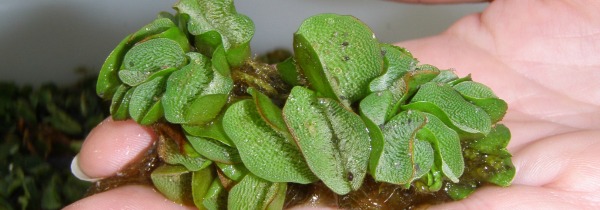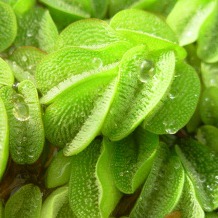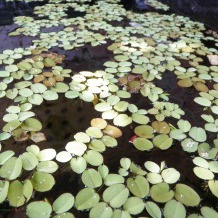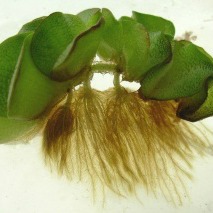Salvinia
Salvinia (Salvinia molesta) is a State prohibited weed.

If you find Salvinia
If you think you have seen Salvinia, please contact us by:
- completing this form
- calling our Customer Service Centre on 136 186
- emailing weed.spotters@agriculture.vic.gov.au
Please do not attempt to treat or dispose of this weed yourself. We will treat, remove and dispose of salvinia safely, at no cost to the land owner.
Why you must report Salvinia
Salvinia floats on the water surface and can quickly spread to cover entire water bodies. In just one season, it can cover a whole dam, making it important to report it as soon as possible to stop it from establishing and spreading.
It can block waterways, impacting on agricultural and recreational activities, and decreases water quality affecting on our natural environment.
Salvinia originated in South America and was brought here as a plant for fish tanks and ponds. It is now in rivers and lakes in Queensland, New South Wales, the Northern Territory, and Western Australia, and is a problematic weed in:
- North America
- Hawaii
- Philippines
- South East Asia
- PNG
- India
- Africa
- New Zealand
Identifying Salvinia
This is Salvinia.
Salvinia has two kinds of leaves one floating and the other submerged. The floating leaves are green oval shaped and covered in waxy hairs which make the leaves water repellent.
The leaf shape varies depending on how crowded the plants are and the growth stage that it is in.
For a crowded plant the leaves are oblong and deeply folded together.
Isolated plants lie flat on the water surface.
Submerged leaves act and look like roots. There is no true root system.
Salvinia has been found in waterways, garden ponds, dams and for sale illegally at markets and online.
Salvinia has small, oval shaped leaves that grow in pairs and are covered in eggbeater shaped waxy hairs that repel water.
When crowded, leaves become tightly packed and deeply folded. Isolated plants have leaves that are oblong to oval or round, and lie flat on the water surface.
Submerged leaves look like roots, with short brown hairy stalks ending in hairy filaments that can grow up to 30 cm long.



Lookalike species
Azolla plants (Azolla spp.) are also small, floating, perennial ferns with long free hanging roots, that are commonly mistaken for salvinia. The key difference is in the leaf shape and colour. Azolla has triangular shaped leaves that become red in colour when exposed to high levels of sunlight.
In Victoria, we only have one species of salvinia, Salvinia molesta. It is illegal to buy, sell, display, or move this plant.
Salvinia molesta looks a lot like other plants, such as Salvinia minima and Salvinia natans. DNA testing is required to identify which Salvinia species a plant is.
People sell salvinia plants on websites like Facebook Marketplace, Gumtree, and eBay all over Australia, advertising them under names such as Salvinia minima (also called water spangles), even though this species has not been found in Australia.
Agriculture Victoria tested over 30 of these plants, and every time, they turned out to be Salvinia molesta. It is very likely that all the salvinia plants in Victoria are Salvinia molesta, even if they are advertised as something else.
Salvinia 3D model
The New South Wales Department of Primary Industries has developed 3D (three-dimensional) models to help people become more familiar with prohibited invasive plants, including salvinia, by providing a lifelike representation.
The model can be manipulated and inspected at every angle and magnification and is a great way to become more familiar with salvinia.
© Regional NSW through NSW DPI Invasive Species Biosecurity. Model created by Rachel Klyve.
View the model